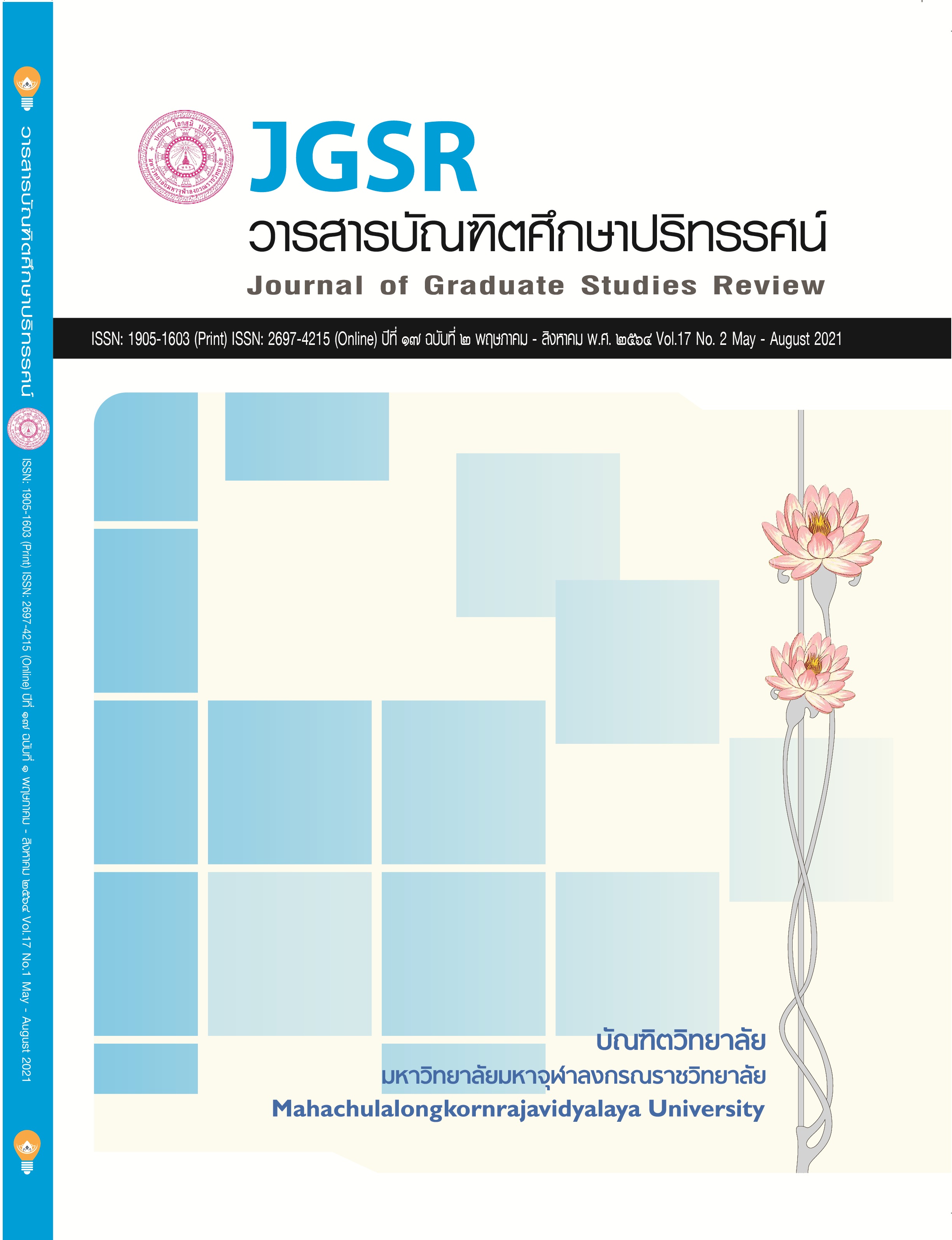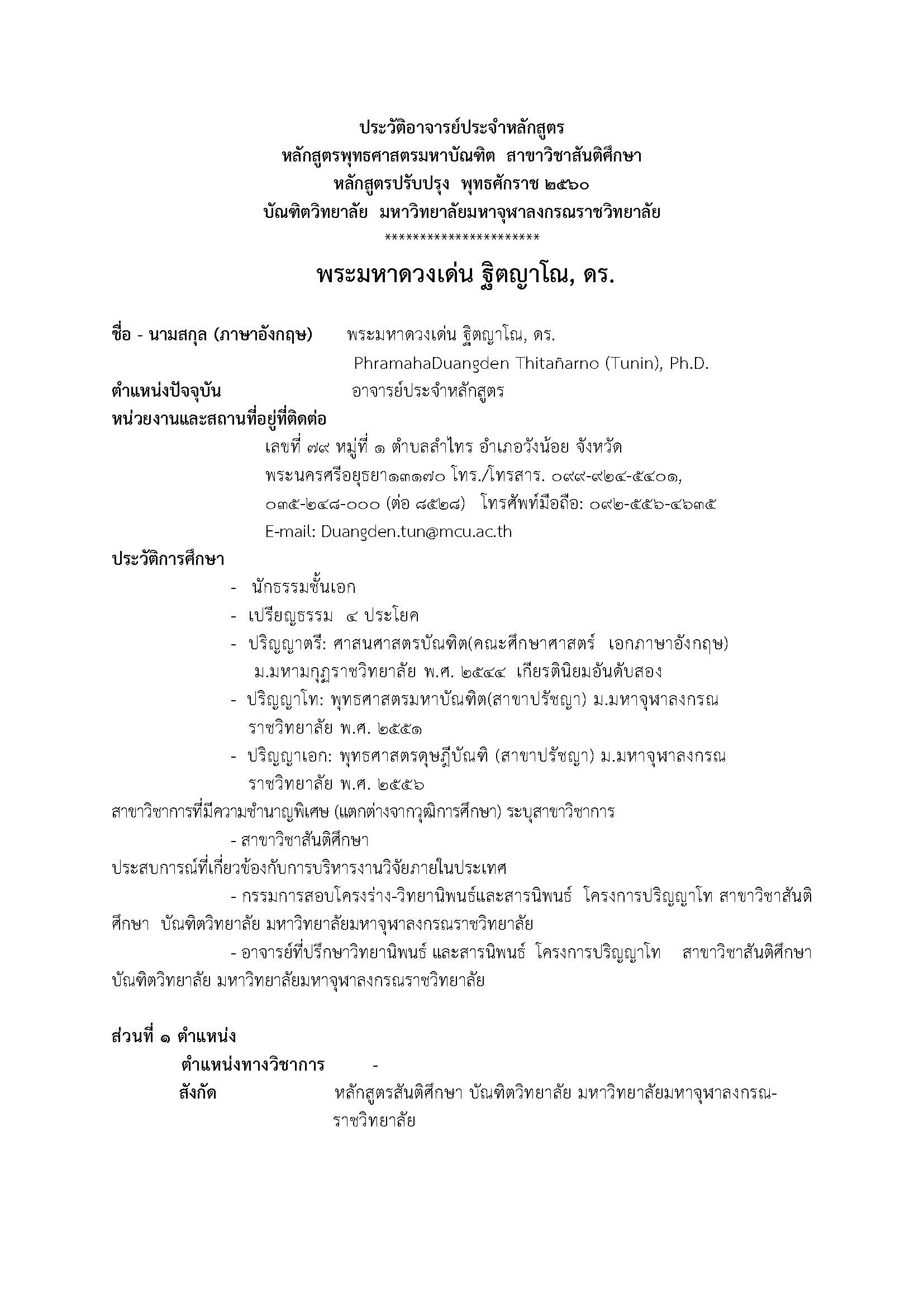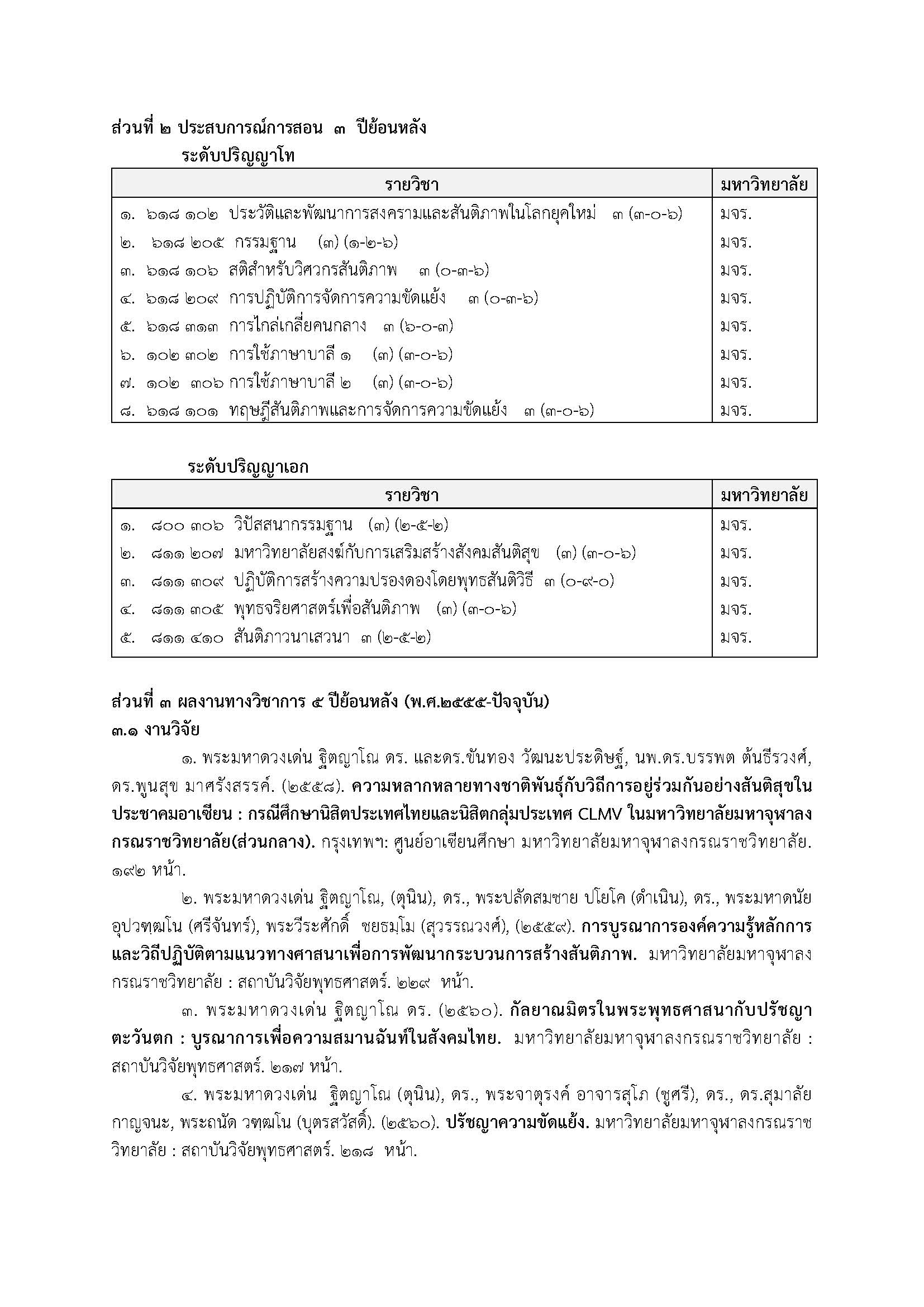คุณลักษณะผู้นำท้องถิ่นที่ส่งผลต่อการสร้างสันติสุขในชุมชน
Main Article Content
บทคัดย่อ
การวิจัยคุณลักษณะผู้นำท้องถิ่นที่ส่งผลต่อการสร้างสันติสุขในชุมชน มีวัตถุประสงค์ ๑) เพื่อศึกษาคุณลักษณะของผู้นำสันติภาพท้องถิ่นชุมชนที่พึงประสงค์ในจังหวัดปทุมธานีและจังหวัดพระนครศรีอยุธยา ๒) เพื่อนำเสนอองค์ประกอบและตัวชี้วัดคุณลักษณะของผู้นำสันติภาพท้องถิ่นที่ส่งผลต่อการสร้างสันติสุขในชุมชน โดยการออกแบบการวิจัยเพื่อมุ่งผลการดำเนินการในอนาคต (EDFR: Ethnographic Delphi Future Research) กลุ่มผู้ให้ข้อมูลสำคัญได้แก่ ด้านสันติวิธี ด้านการไกล่เกลี่ย ด้านการพัฒนาผู้นำ ด้านสื่อสารสันติ ด้านผู้นำต้นแบบ ด้าน พหุวัฒนธรรม ด้านกระบวนกร
ผลการวิจัยพบว่า ๑) คุณลักษณะของผู้นำสันติภาพท้องถิ่นที่ชุมชนพึงประสงค์ พบว่า ต้องมีคุณลักษณะทั้ง ๔ ด้าน คือ ๑) ด้านจิตภาพ ๒) ด้านกายภาพ ๓) ด้านสังคมภาพ ๔) ด้านปัญญาภาพ คือ ด้านจิตภาพ ต้องเคารพความในความแตกต่าง มีทัศนคติด้านสันติวิธี มีความซื่อสัตย์ สุจริต มีความเสียสละ จิตอาสา มีจิตหนักแน่นมั่นคง ไม่อคติ มีใจเป็นกลาง และสุดท้ายต้องมีความเมตตากรุณา ด้านกายภาพ ต้องมีศีลธรรม คุณธรรม จารีตประเพณีอันดีงาม ด้านสังคมภาพ ต้องใส่ใจช่วยเหลือ มีมนุษยสัมพันธ์ดี และ ด้านปัญญาภาพ พัฒนาเรียนรู้อยู่เสมอ สื่อสารเป็น รู้จักคิดวิเคราะห์ สามารถแก้ไขปัญหาได้ มีส่วนร่วม พร้อมรับฟังความเห็น ความเป็นนักวิศวกรสันติภาพท้องถิ่นจะต้องเป็นผู้ที่มีหน้าที่สร้างสันติสุขให้กับชุมชน เป็นผู้ประสาน สร้างความเปลี่ยนแปลง เน้นการมีส่วนร่วม มีมนุษย์สัมพันธ์ ไม่ใช้ความรุนแรง ไม่แบ่งแยกด้านเชื้อชาติศาสนา เป็นคนที่มีบทบาทสนับสนุนส่งเสริมบ้าน วัด โรงเรียนให้มาทำกิจกรรมหรือสร้างความสามัคคีร่วมกัน ๒) องค์ประกอบและตัวชี้วัดคุณลักษณะของผู้นำสันติภาพท้องถิ่นที่ส่งผลต่อการสร้างสันติสุขในชุมชน พบว่า องค์ประกอบและตัวชี้วัดคุณลักษณะของผู้นำสันติภาพท้องถิ่น มี ๑๓ องค์ประกอบ ๕๖ ตัวชี้วัด ได้แก่ (๑) ด้านจิตภาพ มี ๗ ตัวชี้วัด (๒) ด้านกายภาพ มี ๓ ตัวชี้วัด (๓) ด้านสังคมภาพ มี ๒ ตัวชี้วัด ๔) ด้านปัญญาภาพ มี ๖ ตัวชี้วัด (๕) ด้านอุดมการณ์ มี ๕ ตัวชี้วัด (๖) ด้านวิสัยทัศน์ มี ๕ ตัวชี้วัด (๗) ด้านการประพฤติปฏิบัติตน มี ๓ ตัวชี้วัด (๘) ด้านการเสริมสร้างความสัมพันธ์ชุมชน มี ๓ ตัวชี้วัด (๙) ด้านการจัดการความขัดแย้ง มี ๓ ตัวชี้วัด (๑๐) ด้านการสื่อสารอย่างสันติ มี ๕ ตัวชี้วัด (๑๑) ด้านการสร้างความร่วมมือและกำหนดจุดหมายร่วมกันของชุมชน มี ๖ ตัวชี้วัด (๑๒) ด้านพลังเรียนรู้ความคิดสร้างสรรค์ สร้างชุมชนแห่งการเรียนรู้ มี ๔ ตัวชี้วัด (๑๓) ด้านการสร้างเครือข่าย มี ๔ ตัวชี้วัด
Article Details
บทความนี้เป็นความคิดเห็นส่วนผู้แต่ง กองบรรณาธิการไม่จำเป็นต้องเห็นด้วยเสมอไป
เอกสารอ้างอิง
กมล ฉายาวัฒนะ. บริหารคนและงานด้วยวิธีการของพระพุทธเจ้า. กรุงเทพมหานคร: บริษัท พิมพ์ดีการพิมพ์ จำกัด. ๒๕๕๔. หน้า ๑๕๓.
กองแผนงานสำนักงานตำรวจแห่งชาติ. คู่มือเจ้าหน้าที่ผู้ปฏิบัติงานชุมชนและมวลขนสัมพันธ์. กรุงเทพมหานคร: โรงพิมพ์ตำรวจ. ๒๕๔๖. หน้า ๑๕๘-๑๖๑.
ปาริชาติ วลัยเสถียร และคณะ. กระบวนการและเทคนิคการทำงานของนักพัฒนา. กรุงเทพมหานคร: สำนักงานกองทุนสนับสนุนการวิจัย. ๒๕๔๓. หน้า ๒๒๘.
วิฑูรย์ สิมะโชคดี. ทฤษฎีและเทคนิคปฏิบัติสำหรับยอดหัวหน้างาน. กรุงเทพมหนคร: บริษัทชีเอ็ดยูเคชั่น จำกัด มหาชน. ๒๕๓๘. หน้า ๑๐๔.
สงวน นิตยารัมภ์พงศ์. จากรากหญ้าถึงขอบฟ้า: อดีต ปัจจุบันและอนาคตขององค์กรพัฒนาเอกชนไทย. กรุงเทพมหานคร: คบไฟ. ๒๕๔๔. หน้า ๒๕.
สมพิศ วิชญวิเชียร. เป็นหัวไม่ใช่หาง. กรุงเทพมหานคร: จุฬาลงกรณ์มหาวิทยาลัย. ๒๕๔๒. หน้า ๑๑.
สำนักบริหารการปกครองท้องที่ กรมการปกครอง กระทรวงมหาดไทย. คู่มือคณะกรรมการหมู่บ้าน. กรุงเทพมหานคร: อาสารักษาดินแดน. ๒๕๕๕. หน้า ๖๗.
วรภาส ประสมสุข และ นิพนธ์ กินาวงศ์. “หลักการบริหารการศึกษาตามแนวพุทธ”. วารสารศึกษาศาสตร์. ปีที่ ๑๘ ฉบับที่ ๒ พฤศจิกายน ๒๕๔๙-มีนาคม ๒๕๕๐: ๖๓-๘๔.
เจษฎา ซ้อมจันทา. “บทบาทของผู้นำชุมชนในการป้องกันปัญหายาเสพติดพื้นที่เทศบาลนครนครสวรรค์”. ปริญญาพุทธศาสตรมหาบัณฑิต สาขารัฐประศาสนศาสตร์. บัณฑิตวิทยาลัย: มหาวิทยาลัยมหาจุฬาลงกรณราชวิทยาลัย. ๒๕๕๖.
นันทวรรณ อิสรานุวัฒน์ชัย. “ภาวะผู้นำที่พึงประสงค์ในยุคโลกาภิวัตน์: ศึกษาจากหลักพุทธธรรม”. วิทยานิพนธ์พุทธศาสตรมหาบัณฑิต สาขาวิชาพระพุทธศาสนา. บัณฑิตวิทยาลัย: มหาวิทยาลัยมหาจุฬาลงกรณราชวิทยาลัย, ๒๕๕๐.
ปิลัญ ปฏิพิมพาคม. รูปแบบภาวะผู้นำและประสิทธิผลของผู้บริหารสถานศึกษาเอกชนระดับการศึกษาขั้นพื้นฐาน. วิทยานิพนธ์ปรัชญาดุษฎีบัณฑิต บริหารการศึกษา. บัณฑิตวิทยาลัย: มหาวิทยาลัยศิลปากร, ๒๕๕๐.
พระครูพินิจรัตนากร อนุสรณ์ ฐานทตฺโต. “การประยุกต์ใช้พรหมวิหารธรรมในการสร้างสันติสุขใน อำเภอบางพลี จังหวัดสมุทรปราการ การพัฒนาสังคม”. วิทยานิพนธ์พุทธศาสตรมหาบัณฑิต สาขาวิชาการพัฒนาสังคม. บัณฑิตวิทยาลัย: มหาวิทยาลัยมหาจุฬาลงกรณราชวิทยาลัย, ๒๕๕๖.
พระมหาปุณวิทย์ ปุณฺณวิชโย แตะกระโทก. “ภาวะผู้นำที่พึงประสงค์ของพระสังฆาธิการ ตามทัศนะของนิสิตมหาวิทยาลัยมหาจุฬาลงกรณราชวิทยาลัย วิทยาเขต นครราชสีมา”. วิทยานิพนธ์พุทธศาสตรมหาบัณฑิต สาขาวิชารัฐประศาสนศาสตร์. บัณฑิตวิทยาลัย: มหาจุฬาลงกรณราชวิทยาลัย, ๒๕๕๒.
สมคิด สกุลสถาปัตย์. รูปแบบภาวะผู้นำการเปลี่ยนแปลงที่มีประสิทธิผลในการปฏิรูปการศึกษาแบบยั่งยืน. วิทยานิพนธ์ปรัชญาดุษฎีบัณฑิต บริหารการศึกษา. บัณฑิตวิทยาลัย: มหาวิทยาลัยศิลปากร, ๒๕๕๒.
Christopher Moor. The Mediation Process: Practical Strategic for Resolving Conflict. 2nd ed.. San Francisco. CA: Jossey-Bass Publishers. 1996. p.60–61.




